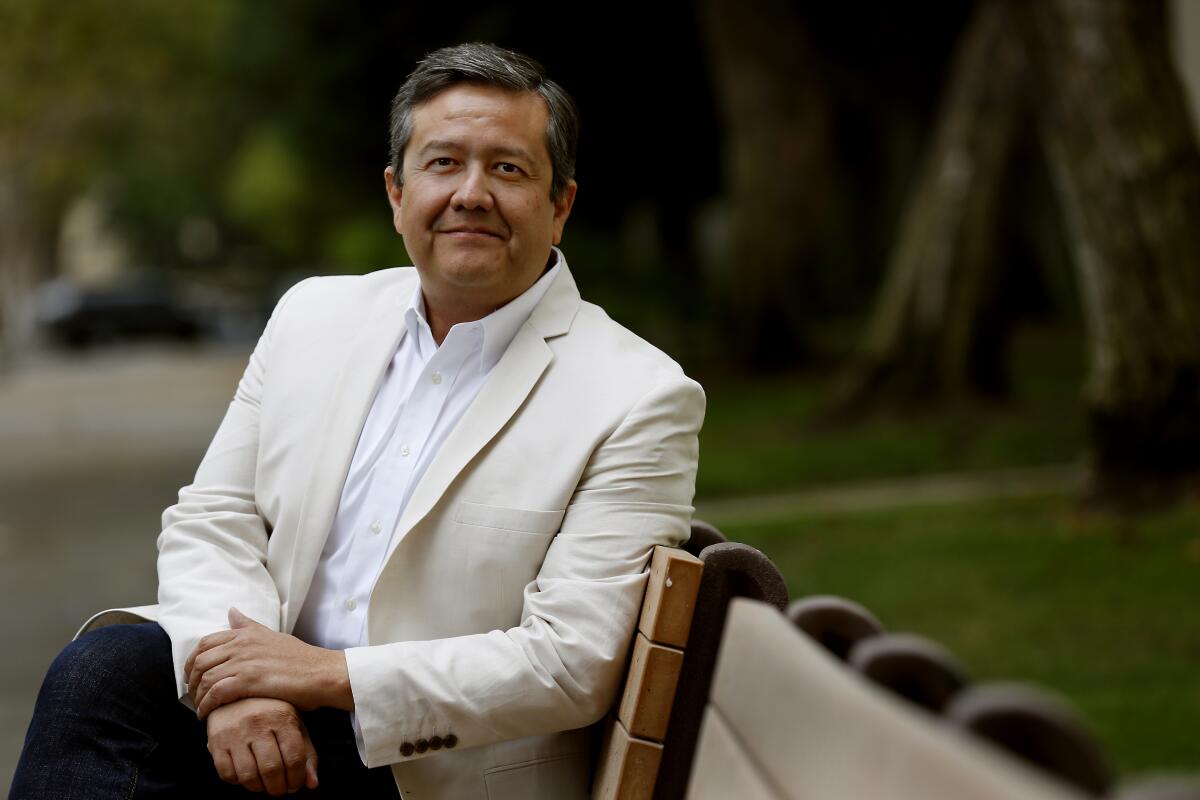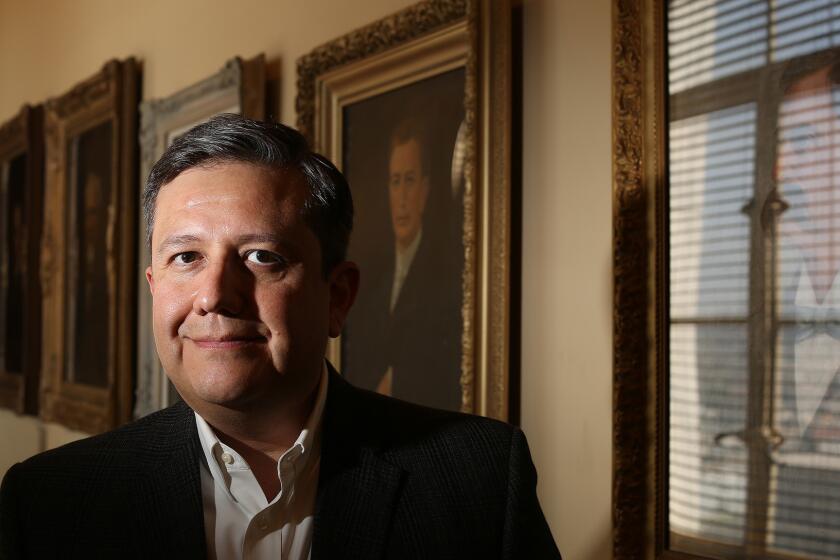Miguel Santana to head California Community Foundation after Antonia Hernández’s retirement

- Share via
After nearly 20 years at the head of the California Community Foundation, Antonia Hernández announced in March that she would retire this year, setting up a potential drama over the future of one of Southern California’s most influential charities.
On Tuesday, the foundation’s board of directors unveiled a transition that will be as smooth as Hernández’s quiet leadership that saw the organization’s assets grow five times over.
Miguel A. Santana, a singular L.A. leader who has held high-level positions in government and philanthropy, will make a short crosstown move from his current position as president and chief executive of the Weingart Foundation to the same role at Weingart’s larger counterpart in public service.
Santana, 54, is scheduled to take over the $640,000-a-year job Oct. 16, three days after Hernández’s departure.
In announcing the appointment, CCF board Chairman Thomas A. Saenz praised Santana’s “unmatched and lengthy leadership track record of successfully confronting myriad challenges in our dynamic region.”
Once chief of staff to then-Supervisor Gloria Molina, Santana rose in the county to become a deputy in the chief executive’s office.
Then, as Los Angeles city administrative officer, he led the city through the Great Recession, building a reputation for soft-spoken but firm discipline in the face of hard financial decisions.
Prior to joining the Weingart Foundation, Santana took over leadership of the financially troubled nonprofit that runs the annual county fair in Pomona and managed its recovery through the pandemic.
His 2020 decision to lead Weingart ended persistent speculation that he might be a candidate for mayor.
‘An end to all the excuses,’ says L.A.’s chief bureaucrat in push for $1.8-billion homelessness plan
While guiding Los Angeles on its painful budget recovery, City Administrative Officer Miguel Santana often had to be the naysayer.
Hernández, who began her career as a civil rights litigator, became a low-profile power broker at CCF who exerted influence by building assets and focusing them on improving the lives of the poor and vulnerable. Since she became president in 2004, CCF grew its $540 million in assets to $2.3 billion and granted more than $3.4 billion to nonprofits in education, health, housing, immigration and the arts.
Earlier this year, Hernández led CCF’s move from leased quarters to its first permanent home, a renovated 54,000-square-foot building in downtown Los Angeles.
Hernández, Saenz said, “has built CCF to a position of great strength and incomparable reputation; Miguel Santana is the right leader to build from that extraordinary foundation to greater heights for the foundation and for the Los Angeles region.”
New Head of Mexican American Legal Defense Fund : Antonia Hernandez Not Afraid to Say She Loves U.S.
Antonia Hernandez had already passed the California State Bar when she was asked in 1975 to show her proficiency in English in order to complete her naturalization as a United States citizen.
The two leaders’ paths have intertwined for decades. Santana entered public affairs as a community liaison at the Mexican American Legal Defense and Education Fund, the organization Hernández led for nearly 20 years before moving to the foundation.
Both shared ties to Molina, the former Los Angeles councilwoman and supervisor, who died in May shortly after Hernández, 75, announced her retirement. As MALDEF leader, Hernández won a redistricting case that led to Molina’s election as the first Latina supervisor.
As city administrative officer, Santana collaborated with CCF and other nonprofits in developing the city’s Homelessness Initiative that led to the 2016 Proposition HHH housing bond.
More recently, Hernández and Santana formed ties between their organizations. They created the L.A. Justice Fund, which has granted $7.4 million to provide legal representation to individuals and families facing deportation proceedings.
In February, after collaborating on a study of staff burnout in immigrant support organizations, the two foundations announced a joint $500,000 fund to provide wellness programs and coaching.
“CCF and Weingart are two sides of the same coin when it comes to a number of issues,” Santana said in an interview. “Ensuring that our immigrants receive equitable services and resources is one of them.”
The California Community Foundation has served as a public, charitable organization for Los Angeles County since 1915. It defines its mission as leading positive systemic change that strengthens Los Angeles communities.
The Weingart Foundation, formed in 1951 by real estate investor Ben Weingart, makes grants “to advance racial, social, and economic justice.”
Under Santana, Weingart has moved toward aligning its $850-million investment portfolio with its grant-making philosophy focused on human services, housing, health, education and community power building.
“By integrating both our philanthropy and our investments under one mission, the Weingart’s impact is much greater,” he said.
Santana said he will retain his position as chairman of the Committee for Greater LA, a group of business, philanthropic, government and academic leaders that aims to “advance systems change and dismantle the institutions and policies that have perpetuated institutional racism.”
“For someone who has been in public service my whole career, I feel very connected to Weingart and the California Community Foundation, so my mission and work isn’t going to change,” Santana said. “It is going to be advanced just from a different place.”
More to Read
Sign up for Essential California
The most important California stories and recommendations in your inbox every morning.
You may occasionally receive promotional content from the Los Angeles Times.












